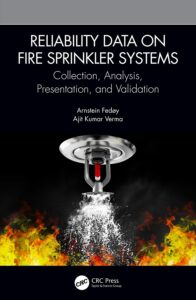Reliability Data on Fire Sprinkler Systems-Collection, Analysis, Presentation, and Validation
Reliability Data on Fire Sprinkler Systems-Collection, Analysis, Presentation, and Validation
Reliability Data on Fire Sprinkler Systems-Collection, Analysis, Presentation, and Validation takes a different approach to the subject of extinguishing reliability, in this case, sprinkler systems, than most literature in the area. Unlike other work, it insists that the principles of fire dynamics, extinguishing, and reli-ability theory understood. This is the starting point of the book.
Since the introduction of extinguishing systems, from perforated pipes linked to water tanks or outlets, to the first automatic sprinkler, produced by Henry Parmelee in 1864, to the first “practical automatic sprinkler” in 1874 (TYCO, 2005), the use of automatic sprinkler systems as a tool against fire loss has been popular. In the beginning, this driven by success stories about systems that saved buildings, allowing business to continue after a relatively short time.
Reliability Data on Fire Sprinkler Systems-Collection, Analysis, Presentation, and Validation Features ![Reliability Data on Fire Sprinkler Systems-Collection, Analysis, Presentation, and Validation]()
- Includes an in-depth study on relevant sprinkler reliability studies based for the first time on critical review and document analysis
- Presents a scientific validating analysis of studies based on how a survey should be conducted
- Critiques the fact that reliability of a sprinkler system as its ability to function as designed, has never been subject to surveys
- Suggestions for new survey methodology that can be used for the field of engineering, including all active and passive fire protection measures
- Discusses extinguishing theory, general design of extinguishing systems, different systems and the reliability of them all
Content
- Introduction.
- Today’s Data: A Study of the Literature.
- Investigate How Data Collected, Analysed, and Presented in Selected Studies.
- Understand Reliability Theory and Calculation,Including Uncertainty Analyse and Calculation.
- Develop Methodologies and Proposals for Studies with General Scientific Value with Examples on Calculation.
- Conclusion.
The book is also unique in that it provides a critical review of the relevant literature


Comments are closed.